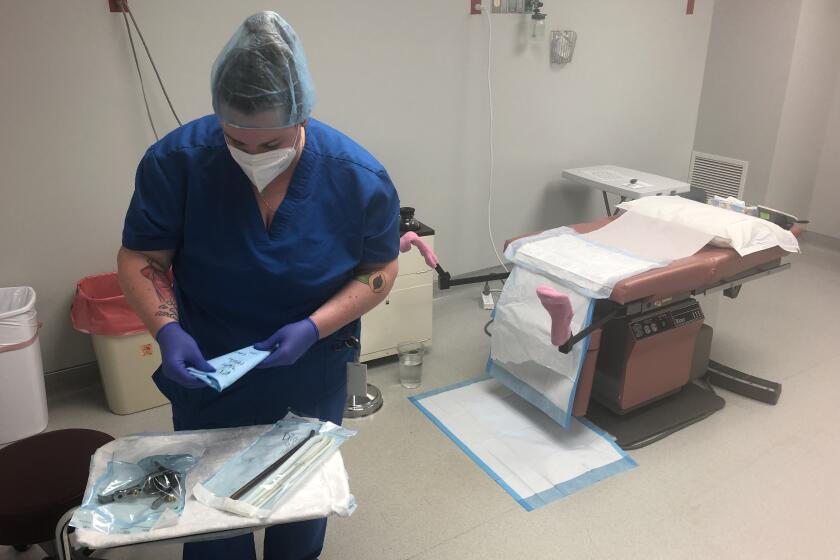What happened to Texas’ tilt from red to blue? That’s a gray area
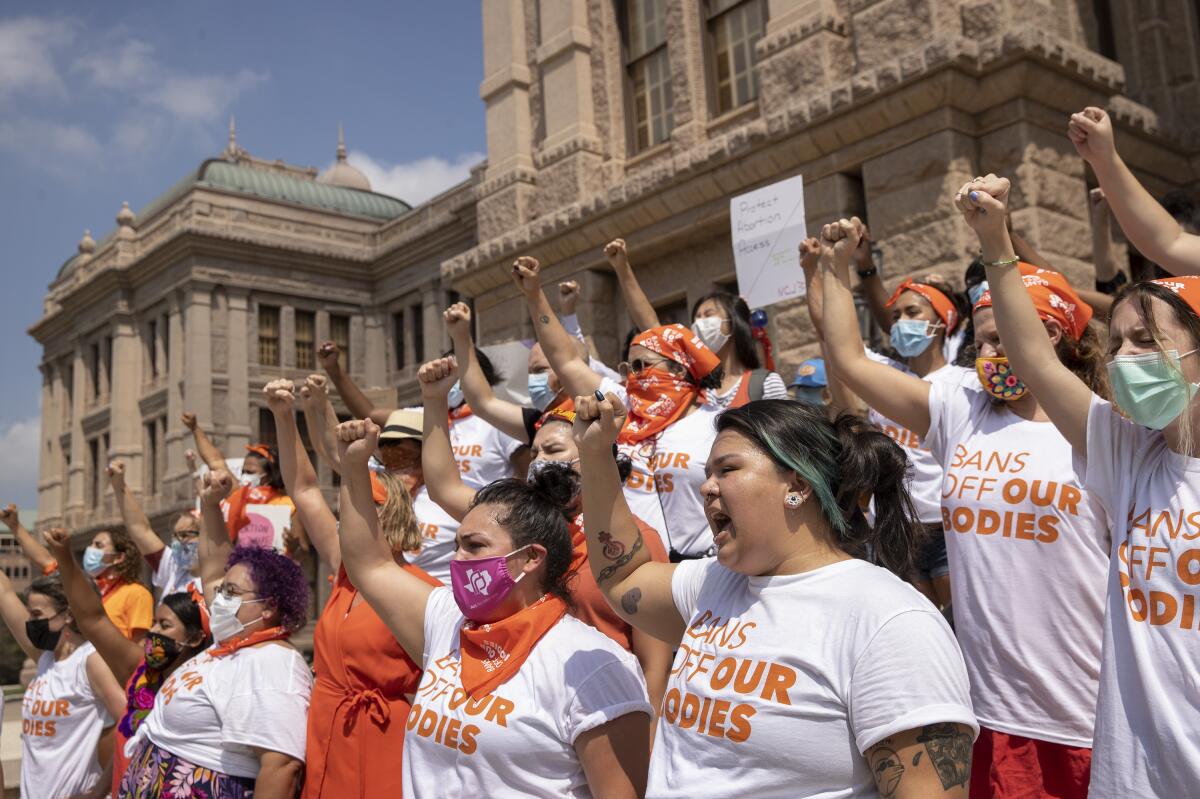
- Share via
HOUSTON — As state legislators reconvened Thursday, filing into their Capitol chambers — many in cowboy boots — to pledge allegiance to the state flag and cheer, “God bless Texas!” they were confronted by two dozen protesters chanting, “Enough is enough!”
Among them was Karen Krajcer, a writer and mother of two who grew up in Houston before settling in Austin.
“Our cities are blue, but they’re being chopped up by redistricting — it’s happening right now,” said Krajcer, 43, noting that her husband, an architect, has benefited from the influx of transplants to the capital, but that they now worry: “Who’s going to want to move here with all of this happening? What kind of a place is Texas going to become?”
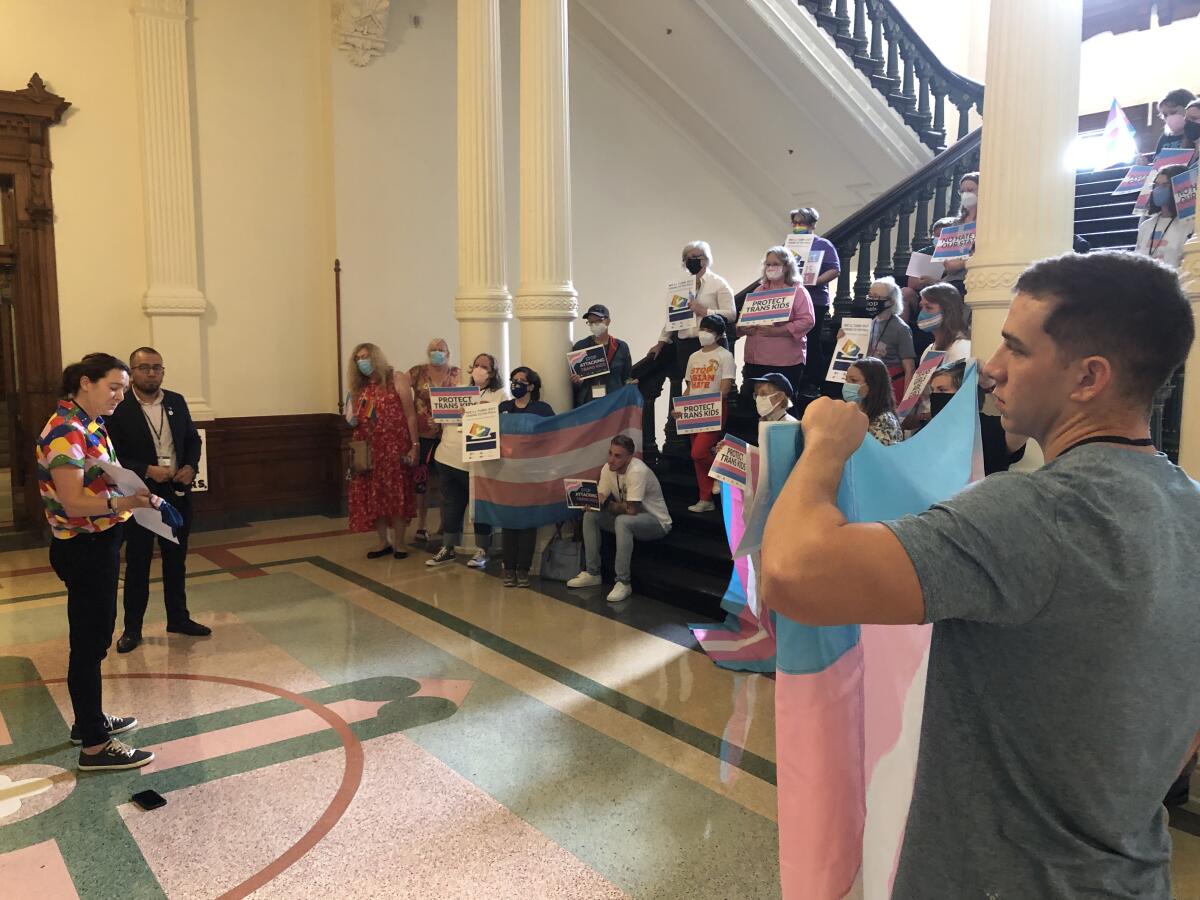
This year, during three special legislative sessions convened by the Republican governor, the state’s overwhelmingly conservative lawmakers launched a right-wing agenda that’s a direct rebuke to the Biden administration. At one point, Democrats left the state to block passages of voting restrictions, appearing with members of the Biden administration in Washington. But they ultimately returned to Texas, and the measures passed.
“During the Obama administration, Texas was the antithesis to the administration. And during the Biden administration, Texas is again,” said Mark Jones, a political science professor at Houston’s Rice University.
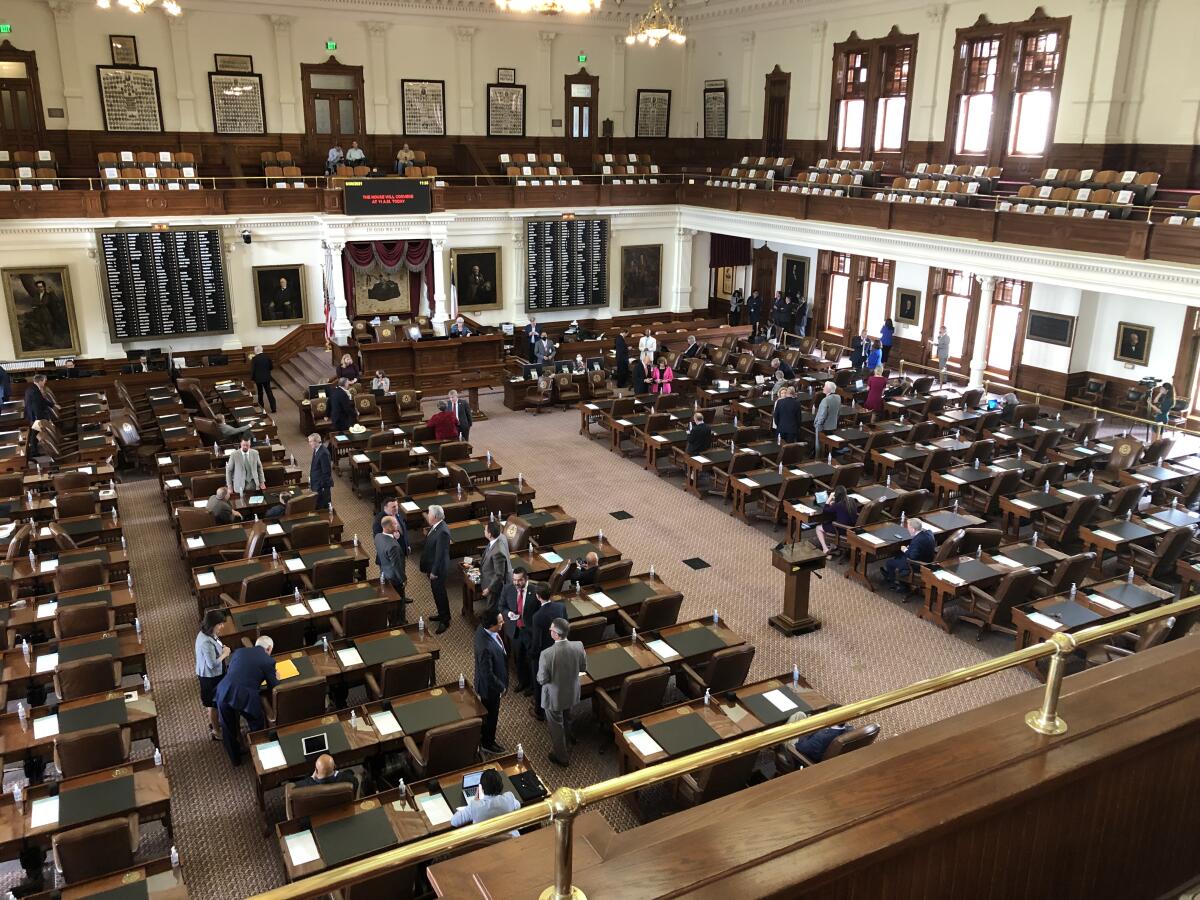
Texas shocked the nation last month by effectively banning abortion — even for incest and rape — using a novel approach so far upheld by the courts that, instead of requiring state enforcement, allows individuals to file lawsuits against those seeking abortions or anyone who assists them. Texas also eliminated gun permits, blocked critical race theory and mask and vaccine mandates in public schools, sent state law enforcement to the border and started building a state-funded border wall.
The raft of conservative legislation and executive actions by GOP Gov. Greg Abbott confounded expectations that Texas was turning blue as it diversified and attracted transplants, including Californians. It’s also frustrated many Texans: For the first time in more than a decade, a majority of those polled by the University of Texas this summer said they thought the state was headed in the wrong direction.
And Texas lawmakers are not finished yet: During the latest monthlong special session that started last month, they’re scheduled to consider legislative redistricting designed to consolidate Republican power (Democrats sued to block it — so far, unsuccessfully) and a proposal to ban transgender youths in sports.
Propelled by a very restrictive abortion law, Texas women are traveling farther afield for abortions.
That’s what drew Krajcer — mother of a 9-year-old transgender girl — and two dozen other protesters to the Capitol on Thursday. Only one counterprotester appeared, a woman who declined to give her name, wearing a button that said, “Protect girls’ sports” and holding a handmade sign that said, “No boys in girls sports protect our TX daughters.”
“I have seven granddaughters and I want them to be able to play sports without males to compete with,” she said.
She offered fliers to legislators as they passed. Few accepted, although one gave her a fist bump.
Standing across the hall, Angela Hale of Equality Texas, who has lobbied at the Capitol since the 1990s, said, “This is the most extreme session we’ve ever seen.”
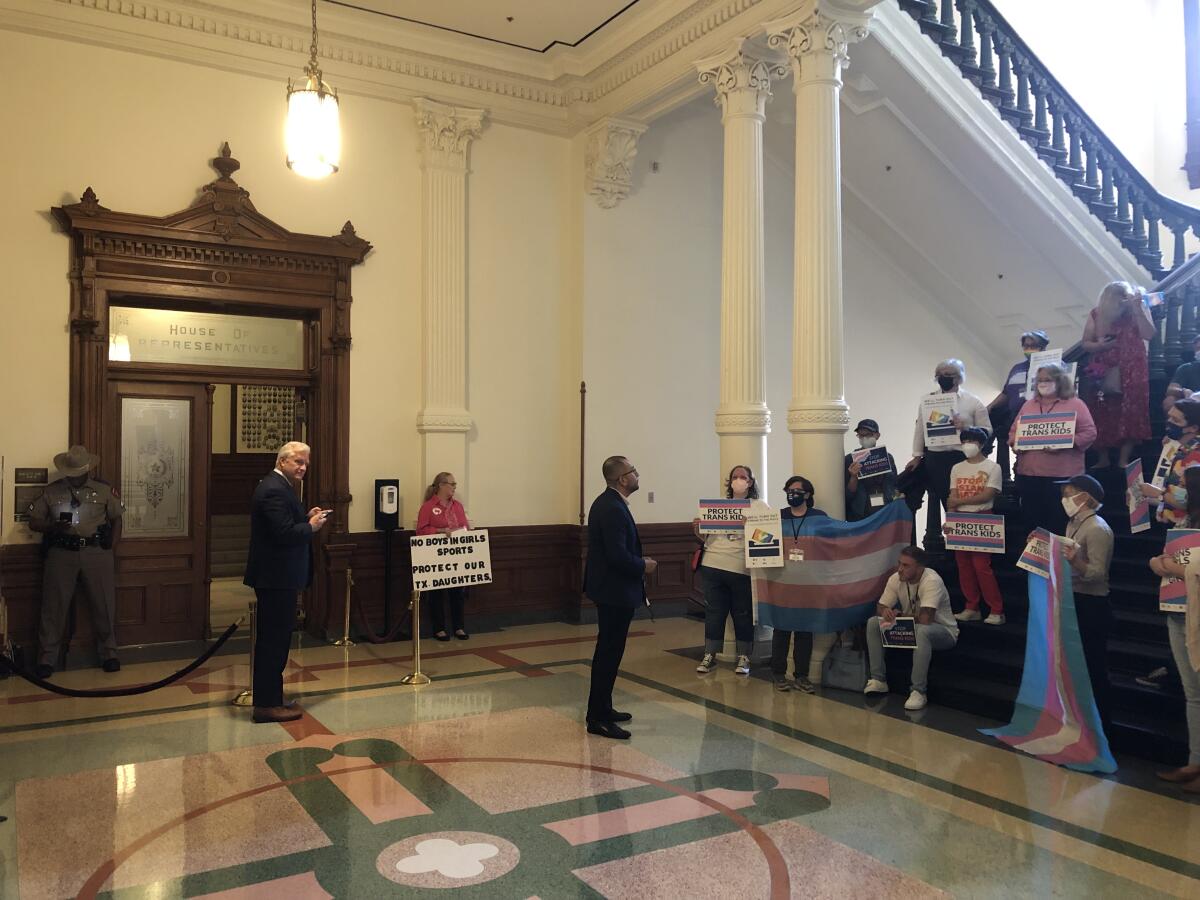
More than 70 anti-LGBTQ measures have been proposed this year, Hale said, “but they keep bringing back this one.” Transgender activists have protested repeatedly, testifying during public comments where opponents called them perverts, their parents child abusers.
“Some of our parents have left the state, they’ve moved, because it was just too much,” Hale said.
Krajcer said she started looking at real estate during a family trip to Portland, Ore., this summer, after Abbott banned mask mandates in public schools.
“I almost didn’t come home,” she said. “One question that keeps popping up on our social media is people who recently moved to Austin thinking it was this blue, liberal bubble asking, is Austin really as liberal as it says it is, or is it all performative? Even these places like Austin that are supposed to be safe havens, Republicans keep bursting these bubbles.”
Haitian migrants continue to pour into Texas. But hoping to avoid deportation, many decide to cross the Rio Grande back to Mexico.
Her parents, “dyed-in-the-wool Republicans” and Trump supporters in Houston, have been calling state lawmakers to drum up opposition to the transgender youth bill, afraid that otherwise she’ll move. The slew of right-wing legislation that already passed this year left her feeling hopeless.
“If bills like those can pass, what hope do I have for my family?” Krajcer said.
When the U.S. Supreme Court allowed the Texas abortion ban to take effect last month, Krajcer was frustrated by the sudden outcry, both in and outside the state.
“People are not stepping up,” she said. “Everybody’s reaction was, ‘How did this happen?’ And I was like, haven’t you been paying attention?”
Another protester, Linzy Foster, mother of a 7-year-old transgender girl, said she and her husband have considered moving from Austin to New Mexico, where state laws protect transgender children and abortion rights.
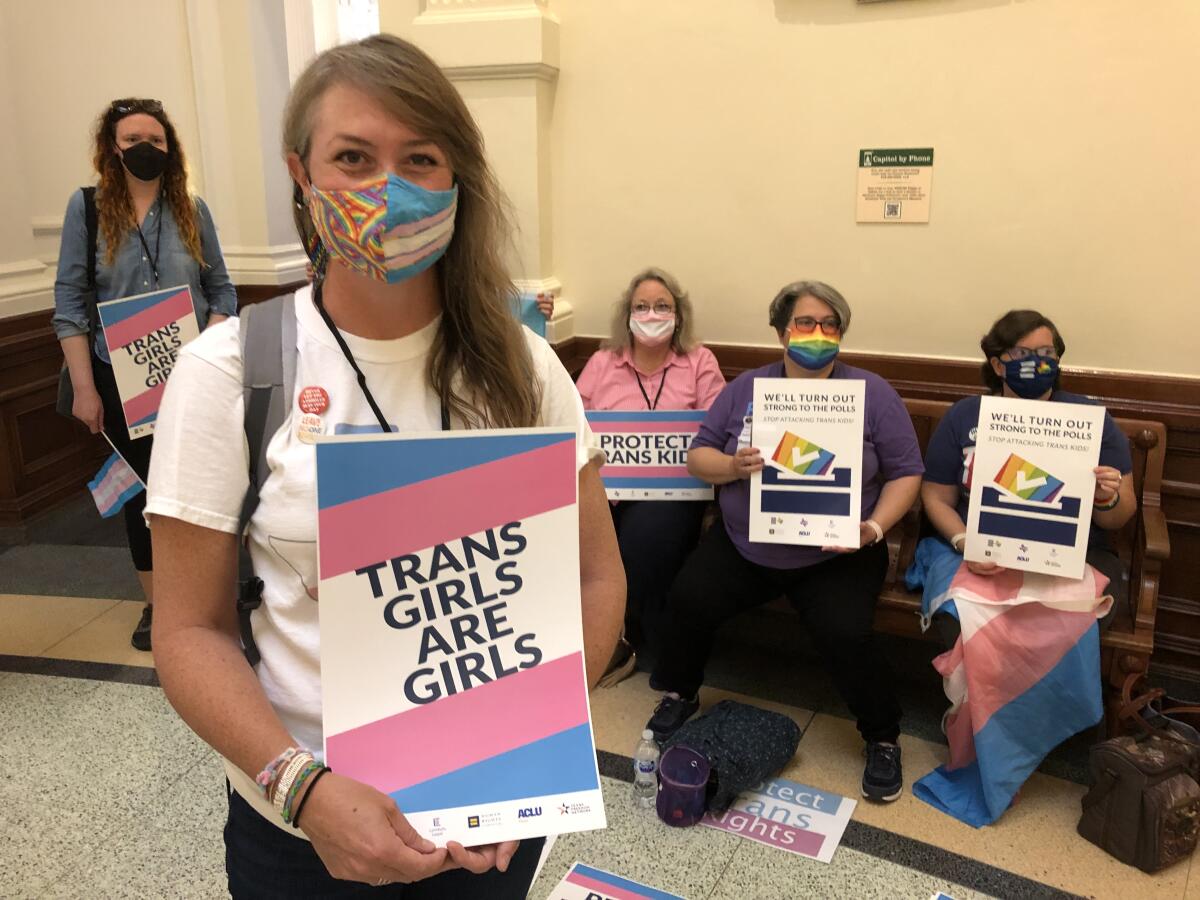
Foster, 42, a hydrologist and native Texan, says most of her relatives are Trump-supporting conservatives, but she was still surprised by the vitriol she’s faced at the Capitol, where she’s been called a child abuser and “mutilator” by counterprotesters this year.
“And we had children present. One of them had to go throw up afterwards,” Foster said. “It’s wrong. And then you think about all the things happening in our state that need attention.”
As PTA co-president, she’d like to see Texas — an anti-union “right to work” state — stop “bleeding teachers” and fix the electrical grid, whose failure led to widespread power outages and scores of deaths last winter.
When her family travels outside Austin, Foster said she has to warn her daughter not to talk about being transgender.
For now, her daughter is thriving at her trans-friendly school and Girl Scout troop, Foster said, but adds, “If it gets too bad, we’ve got to go. I have to do what’s best for her.”
While Texas has remained among the top destinations for departing Californians in recent years, transplants are a political mix, with many backing conservatives. In 2018, more nonnative Texans voted for incumbent Sen. Ted Cruz than for Democratic challenger Beto O’Rourke, enabling Cruz’s victory by a 2-point margin.
Last year, the blue wave of Democratic victories some had predicted in Texas failed to materialize, as Republicans beat challengers in most urban and suburban districts. Unlike Florida, which has become another conservative proving ground post-Trump, no Democrat has won statewide office in Texas since 1994, longer than any other state. Outside the Capitol on Thursday, at least one car with California license plates had a “recall Newsom” bumper sticker.
“Some of the Californians that are moving are political refugees. Some of the people going to Austin, the tech people, they’re bringing the political DNA with them. But you also have Californians fleeing Gavin Newsom and California policies,” Jones said.
While Texas is turning bluer as it grows, that’s largely due to in-state migration of liberal voters to urban centers like Austin, said Jim Henson, a San Pedro, Calif., native who directs the Texas Politics Project.
“This California migration has taken on a real symbolic significance that outstrips its impact on a political level,” Henson said. “People who live here and around the country are calling and want to know what’s going on. Their expectation just a few short years ago was that Texas was headed in a blue or at least competitive direction, and it seems that was wrong.”
For the first time, the Supreme Court has freed Texas legislative redistricting from federal oversight under the Voting Rights Act of 1965, allowing Republicans — who control both houses of the state Legislature — to configure districts to their advantage, experts say, solidifying their majority through 2032.
Abbott, a former state attorney general and judge who’s up for reelection next fall, has championed more conservative policies after he faced a backlash from his party’s right wing over pandemic lockdowns, masks and vaccines, Henson noted.
Because Texas voter turnout is among the lowest in the country, Abbott is catering not to the wishes of nearly 21 million voting-age Texans, the 17 million registered to vote last year or even the registered Republicans, Henson said. His target: 1.7 million extremely conservative voters most likely to show up for the March primary, where Abbott faces two ultraconservative challengers, including Allen West, a Black U.S. Army veteran, tea party stalwart and outgoing chair of the Texas GOP known for incendiary right-wing rhetoric.
“Extremely conservative voters are driving the agenda right now,” Henson said. “The prevailing question that’s hovering over all this now is how far is too far? If you issue a ban on abortion that is as far as you can get toward a ban, legalize permit-less carry, empower poll watchers, legalize this conservative agenda, will you create a problem for yourself in the general election?”
So far, there have been no major corporate protests or boycotts of Texas like there were in Georgia after Republicans passed voting restrictions there earlier this year. There were marches for women’s rights Saturday in Austin, Houston and more than 500 other cities nationwide in response to the abortion ban (the Houston march was led by celebrity chefs Padma Lakshmi and Gail Simmons, in town filming the next season of “Top Chef”).
But people still flocked to the Austin City Limits Music Festival starting last week and a weekend motorcycle racing event at the nearby Circuit of the Americas.
Outside La Barbecue restaurant, a popular Austin lunch spot, manufacturing consultant Rick Saltzman said the new abortion law almost prevented him from visiting for the motorcycle race with his friends from Ohio.
“I said to my wife, ‘We had these tickets ahead of time, but I’m not fond of going to Texas,’” said Saltzman, 72, as he stood next to his BMW motorcycle after lunch. “I thought, should I really go to Texas with what’s going on?”
“Did you really?” said friend Blaine Bahm, 63, who’s more conservative and said he “likes what’s going on” in Texas.
Outside the Capitol, Anthony Filitov, 38, an office worker from Los Angeles — also in town for the race — toured the grounds wearing an anti-COVID-lockdown T-shirt.
“The country’s just going in the wrong direction,” he said. “If my job would let me move, I’d consider Texas.”
Nearby, Natalie Arneson, visiting from upstate New York, played with her three children and their three Texas cousins near a Confederate memorial statue.
Arneson, 38, a performer and native Texan, is liberal, as is her younger brother, although he’s also a gun owner. Their three younger siblings and parents are conservative, including a sister who works for Texas Right to Life and lobbied to pass the abortion ban.
“We figure out how to talk to each other,” she said.
“Or sometimes not,” said brother Matthew Arnold, 36, a mover who lives outside Austin.
His wife, Kelsey Arnold, 32, a commercial insurance underwriter, is a Democrat who supports the abortion ban, although she doesn’t discuss it with liberal friends in Austin.
“The stuff people got upset about is not even in the law,” she said, but “they’re so angry, emotions are running so high, there’s no point talking about it right now.”
Conservative Texas activists said they’re emboldened by recent success, that it’s drawing like-minded voters who see the state as a grand experiment in “limited government.”
John Seago, legislative director at Texas Right to Life, called the abortion ban “the most encouraging developments in the Texas pro-life movement in the more than a decade that I’ve been involved.”
Seago said activists are preparing for the U.S. Supreme Court to consider a Mississippi case that could overturn Roe vs. Wade, since Texas is among about half the states with so-called trigger laws that would make abortion illegal.
“We will have to maintain that,” he said, as well as the abortion ban, which opponents have tried to amend to create exceptions for rape and incest.
“These attacks to undermine the pro-life victories are going to continue to come,” he said. “In Texas, we’re getting a glimpse of what an abortion-free state will look like, what it will look like if Roe vs. Wade is overturned.”
Seago, 35, a father of two, lives in Austin, where he said some of his friends moved from Southern California to escape high taxes and a liberal ethos, especially in public schools. During the pandemic, he said, those who relocated saw the contrast between Abbott and Newsom.
“They are coming for very strong conservative values,” Seago said. “It’s a refugee situation, people who are not comfortable with the California values that are controlling the institutions.”
Matt Rinaldi, who leads the Texas GOP, agreed.
“The Californians and other outsiders moving to Texas are the ones keeping Texas red,” said Rinaldi, a former state legislator who moved from Connecticut 20 years ago. “I’ll get a lot of emails from people who will say, ‘I’m from California and I’m thinking of moving. What’s a good district where I’ll have good representation?’ They’re actually shopping.”
Rinaldi said he wished Republicans had been even more proactive this year, that he’d still like to see them ban transgender youths in sports and reconsider legislation to ban employer vaccine mandates and child gender modification.
“I’m optimistic for the future as long as we stay the course in protecting freedom and limited government,” he said.
At the Capitol on Thursday, some Democratic lawmakers paused on their way into the chamber to take photos with LGBTQ protesters, offering encouragement and reassurances.
“We will move forward to make sure everyone knows you are human, and the state will do everything it can to protect you,” said state Rep. Ann Johnson of Houston, a native Texan, after sharing her coming-out story.
Foster wiped away tears.
“I feel like I should stay and fight,” she said. “We’re Texans too.”
More to Read
Sign up for Essential California
The most important California stories and recommendations in your inbox every morning.
You may occasionally receive promotional content from the Los Angeles Times.

